Text

The word bairn (child), which is used in Scots, Northern and Scottish English, is closely related to born and to the verb to bear. These words all come from a root meaning 'to carry'. When a baby is born it's been carried to term. The infant is then carried around. Click the infographic for more.
#historical linguistics#linguistics#language#etymology#english#german#dutch#scots#old english#old norse#danish#swedish#norwegian#lingblr#icelandic#proto-germanic#gothic#old high german#old saxon#low saxon#old frisian#frisian#old dutch#middle dutch#proto-indo-european
26 notes
·
View notes
Text

Duke, -duce, Herzog & ziehen
Duke comes from the Latin word dux (leader). It's related to the verb dūcere (to lead; pull), whence English -duce, for example in to seduce (whose original Latin meaning was 'to lead astray').
The second part of German Herzog (duke) is cognate to dux. This part, -zog, is related to the German verb ziehen (to pull), cognate of dūcere.
Old English had cognates of both words. Its counterpart of Herzog was heretoga (army leader). In Middle English it became heretowe, which would've become modern *hartow. The Old English cognate of ziehen was tēon. This verb would've become *to tee if it had continued to exist. See the infographic for information about its past tense and past participle.
#historical linguistics#linguistics#language#etymology#english#latin#french#dutch#german#spanish#old english#old french#old dutch#old saxon#low saxon#old high german#old frisian#frisian#romanian#catalan#portuguese#greek#venetian#gothic#lingblr
53 notes
·
View notes
Text
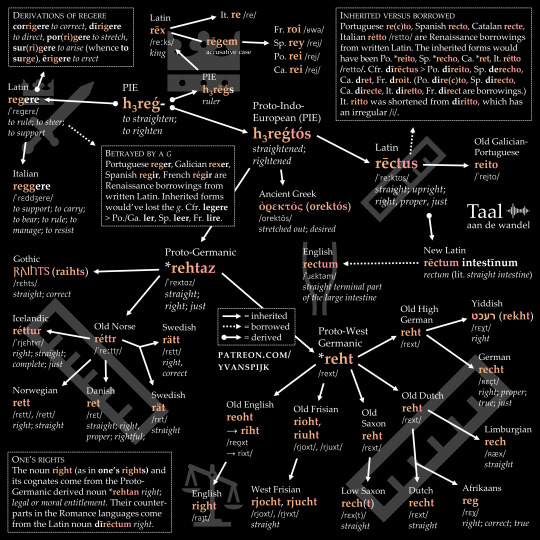
The words right and rectum have a common origin. Right comes from Proto-Germanic *rehtaz ('straight; right; just'). This word shared a common Proto-Indo-European ancestor with Latin rēctus ('straight; right; just'), from which the medical term rectum ('straight terminal part of the large intestine') was derived. The infographic shows more.
#historical linguistics#linguistics#language#etymology#english#dutch#german#low saxon#frisian#old frisian#old saxon#old high german#old english#old dutch#lingblr#proto-germanic#proto-west germanic#yiddish#limburgian#faroese#icelandic#norwegian#swedish#danish#latin#french#spanish#old spanish#old french#old galician-portuguese
53 notes
·
View notes
Text
The word knight sounds like night but it's written with a K. That's because it used to start with a [k] sound, just like German Knecht, which has the same Proto-Germanic ancestor. The letters GH used to be pronounced as well. The video lets you hear the reconstructed evolution of knight from Proto-Germanic to Southern British English.
The common Proto-Germanic ancestor of knight, German Knecht and Dutch knecht meant 'boy; servant; attendant'. In Middle English, knight came to denote an attendant who became a soldier, and subsequently a soldier who became a nobleman through knighthood.
#historical linguistics#linguistics#language#etymology#english#old english#middle english#early modern english#proto-germanic#proto-west germanic#lingblr
97 notes
·
View notes
Text
Dear means 'valued; precious; beloved'. However, in certain expressions it also means 'expensive', such as in to cost dear. This meaning, inherited from Proto-Germanic, became dominant in cognates of dear, such as Dutch duur, German teuer, and Swedish dyr. The infographic tells you the whole story.
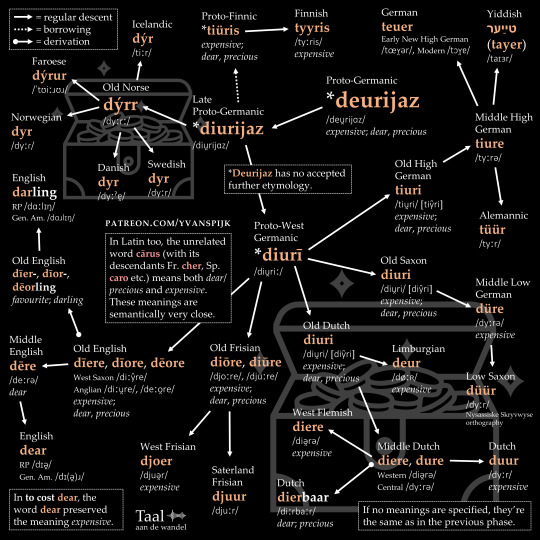
#historical linguistics#linguistics#language#etymology#english#dutch#german#low saxon#frisian#old frisian#old saxon#old high german#old english#old dutch#middle high german#middle dutch#middle english#middle low german#lingblr#proto-germanic#proto-west germanic#yiddish#west flemish#limburgian#saterland frisian#faroese#icelandic#norwegian#swedish#danish
112 notes
·
View notes
Text
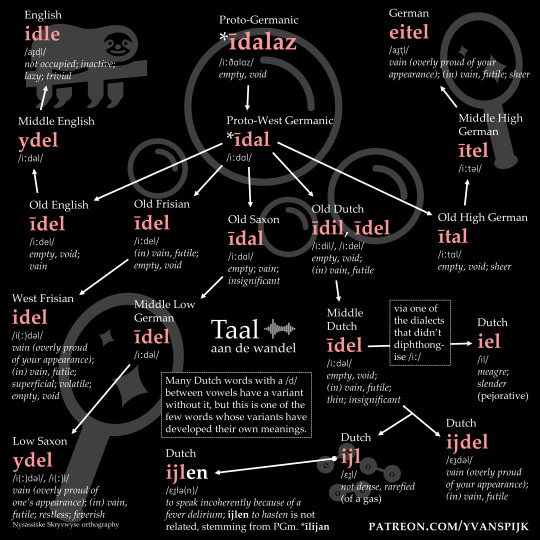
From void to vain
Idle ('inactive; lazy; trivial') has the same origin as German eitel ('vain; futile') and the three Dutch words ijdel ('vain; futile'), ijl ('rarefied'), and iel ('meagre'). They all come from Proto-Germanic *īdalaz ('empty'). Its form and meaning evolved very differently. Dutch ijdel, ijl, and iel are variants that developed from the Middle Dutch word īdel and ended up with distinct meanings.
#historical linguistics#linguistics#language#etymology#english#dutch#german#low saxon#frisian#old frisian#old saxon#old high german#old english#old dutch#middle high german#middle dutch#middle english#middle low german#lingblr#proto-germanic#proto-west germanic
82 notes
·
View notes
Text
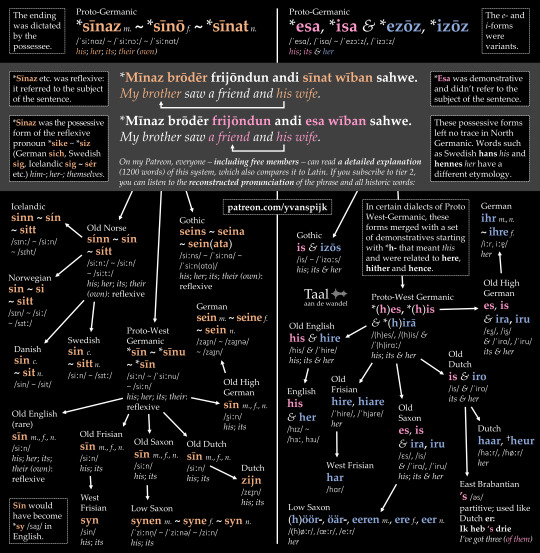
Old as sīn
In certain dialects of Old English, there were two ways to express 'his' and 'her'. Beside his and hire, there was sīn (pronounced ‘seen’), but this pronoun was reflexive: it could only refer to the subject of the sentence. My new infographic and the article below tell you the whole story.
On my Patreon, everyone – including free members – can read a detailed explanation (1200 words) of this system, which also compares it to Latin. If you subscribe to tier 2, you can listen to the reconstructed pronunciation of the phrase and all historic words.
#historical linguistics#linguistics#language#etymology#english#dutch#german#old dutch#old english#old high german#old saxon#low saxon#old frisian#west frisian#gothic#old norse#danish#swedish#icelandic#norwegian#lingblr
85 notes
·
View notes
Text

A mix of four verbs
Am, are, is, was, were, been - how can the verb to be have so many different forms? To be is actually a mix of four entirely different verbs. Over time, they came to constitute one verb. The chart shows how to be and its sister verbs in six other Germanic languages evolved from Proto-Germanic.
Patrons who subscribed to tier 2 of my Patreon can download an audio file of me reading the Proto-Germanic and medieval verb paradigms in their reconstructed pronunciations here.
#historical linguistics#linguistics#language#etymology#english#dutch#german#low saxon#old saxon#old high german#icelandic#old norse#old english#gothic#old dutch#proto-germanic#lingblr
95 notes
·
View notes
Text
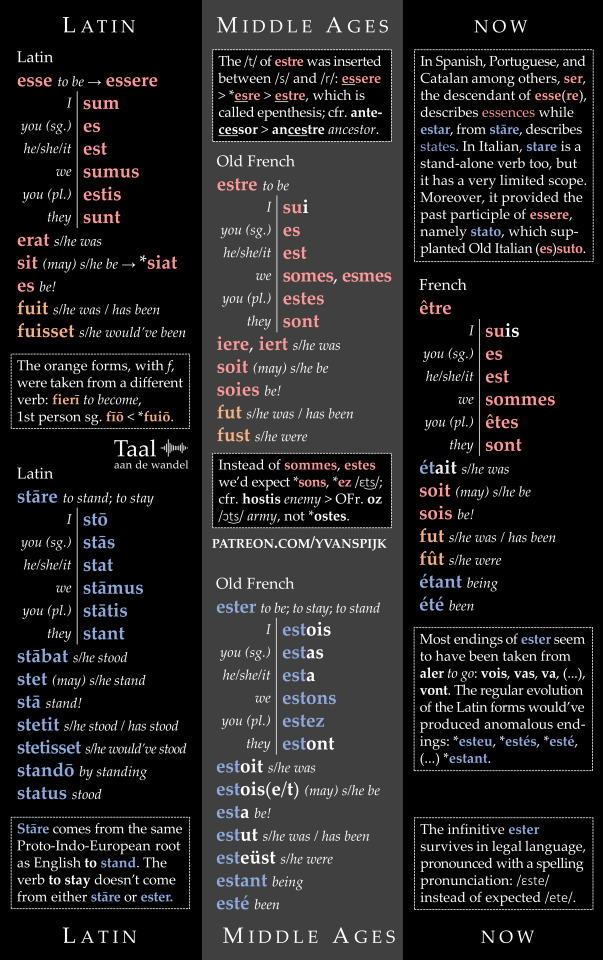
Standing is being
French il est (he is) comes from the Latin verb esse (to be), whereas il était (he was) comes from stāre (to stand; to stay).
In Romance languages such as Spanish and Portuguese, the descendants of esse and stāre both came to mean 'to be', but they remained separate verbs with their own functions: ser is used to describe essences while estar denotes states.
Old French had a counterpart to each of these two verbs - estre versus ester - but they merged before a meaning difference similar to what is found in Spanish and Portuguese could crystallise.
The infographic tells you the story of these French verbs.
118 notes
·
View notes
Text
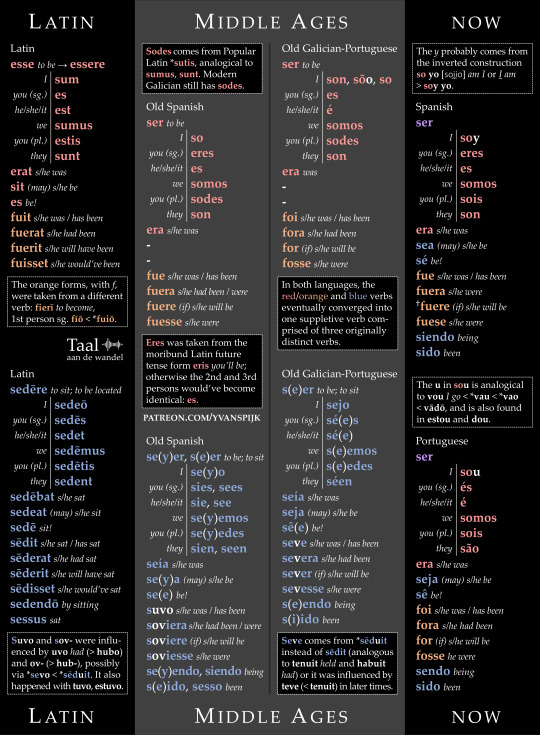
Sitting is being
Spanish sé and Portuguese sê, which mean 'be!', come from Latin sedē, which meant 'sit!' instead. How can that be? Spanish ser and Portuguese ser, verbs meaning 'to be', are a mix of two Latin verbs: esse ('to be') and sedēre ('to sit; to be located'). In medieval Spanish and Portuguese, these were still distinct verbs, but later they merged because both their meanings and their infinitives, namely ser, coincided. The infographic tells you the full stories of these verbs.
#historical linguistics#linguistics#language#etymology#latin#spanish#portuguese#old spanish#old galician-portuguese#lingblr
105 notes
·
View notes
Text

From posse to potēre
The Romance verbs for 'can; to be able to', such as Spanish poder, Italian potere and French pouvoir, stem from Latin, but not from Classical Latin posse. Instead, they come from Popular Latin potēre, a regularised version of highly irregular posse. The infographic tells you the whole story.
#historical linguistics#linguistics#language#etymology#english#latin#french#spanish#catalan#romanian#italian#popular latin#proto-italic#proto-indo-european
71 notes
·
View notes
Text
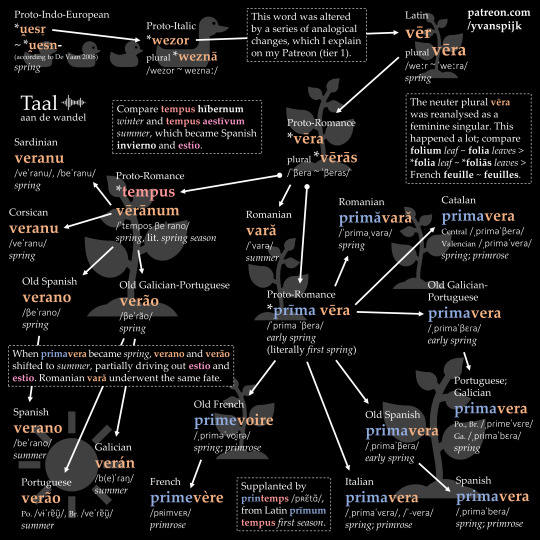
Spring in Romance
Primavera means 'spring' in Romance languages such as Spanish and Italian, but it originally meant 'early spring' (literally 'first spring'). Later it came to mean just 'spring', pushing the earlier words for 'spring', such as Spanish verano and Romanian vară, to the summer.
#historical linguistics#linguistics#language#etymology#english#latin#french#spanish#old spanish#old french#old galician-portuguese#galician#portuguese#sardinian#corsican#catalan#romanian#proto-italic#proto-indo-european
93 notes
·
View notes
Text

The word Lent, which denotes the Christian abstention period of 40 days preceding Easter, used to be the default word for springtime. Its Dutch cognate lente still is the word for 'spring', while German Lenz is now archaic. They all come from a word meaning 'long-day'.
#historical linguistics#linguistics#language#etymology#english#dutch#german#old high german#middle high german#middle dutch#old dutch#low saxon#old saxon#middle low german#middle english#old english#proto-germanic#proto-west germanic#lingblr
97 notes
·
View notes
Text

English is part of a large language family that includes French, Welsh, Polish, Persian, Greek, and Albanian. They stem from a common ancestor reconstructed as Proto-Indo-European. The cardinal numerals from 1 to 10 illustrate their relationship well. Click the image for a selection.
#historical linguistics#linguistics#language#etymology#english#latin#french#german#spanish#welsh#irish#sanskrit#persian#polish#russian#italian#gothic#proto-germanic#proto-celtic#proto-indo-iranian#proto-balto-slavic#lithuanian#ancient greek#albanian#icelandic
86 notes
·
View notes
Text
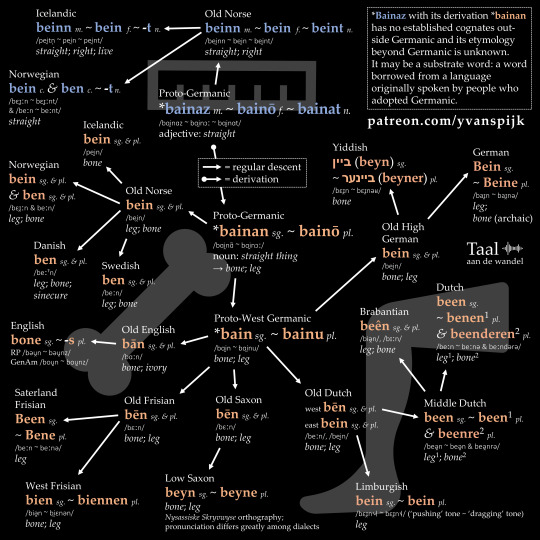
Bone & Bein
The word bone has the same origin as German Bein, Dutch been, and Swedish ben, which mean both 'bone' and 'leg'. These nouns are thought to stem from an adjective meaning 'straight'. It lives on in Icelandic beinn and Norwegian be(i)n 'straight; right'.
#historical linguistics#linguistics#language#etymology#english#dutch#german#old english#old dutch#old high german#old saxon#low saxon#old frisian#west frisian#old norse#norwegian#danish#swedish#lingblr#catalan#limburgish#brabantian#yiddish#saterland frisian
56 notes
·
View notes
Text

Foreign is etymologically related to door. Foreign stems from Popular Latin *forānus ('outsider'), a derivation of Latin forīs ('outside'). It got its silent g because people believed it had something to do with reign. Latin forīs is a cousin of door. See the infographic for more.
#historical linguistics#linguistics#language#etymology#english#latin#french#dutch#german#spanish#old english#proto-italic#old french#old dutch#old high german#old spanish#portuguese#old galician-portuguese#proto-indo-european#gothic#old saxon#low saxon#old frisian#west frisian#old norse#norwegian#danish#swedish#lingblr#catalan
75 notes
·
View notes
Text
Your aws and your ears
Eye could've been aw. In an early form of Proto-Germanic, the word for 'eye' must've been *agōn. This would've become English aw. However, eye, German Auge, Norwegian auga, Dutch oog etc. all point to a later form *augōn. Its U was probably copied from *auzōn, the ancestor of ear. See the infographic for more.

#historical linguistics#linguistics#language#etymology#english#latin#french#dutch#german#spanish#old english#old dutch#old high german#portuguese#proto-indo-european#ancient greek#greek#gothic#old saxon#low saxon#old frisian#west frisian#old norse#norwegian#danish#swedish#lingblr#yiddish#brabantian#limburgian
65 notes
·
View notes